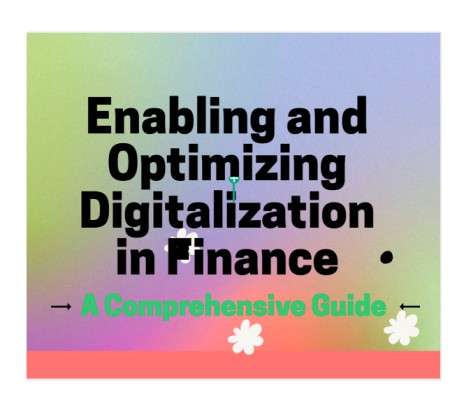
Visits: 1
Enabling and Optimizing Digitalization in Finance: A Comprehensive Guide
In an era dominated by technological advancements, the finance industry is undergoing a radical transformation through digitalization. This guide explores the strategies, innovations, and challenges associated with enabling and optimizing digitalization in finance. Enabling and Optimizing Digitalization in Finance: A Comprehensive Guide
Key Considerations in Enabling Digitalization
- Developing a Robust Digital Infrastructure
- Establishing a secure and scalable digital infrastructure is fundamental to the success of any financial institution’s digitalization journey.
- Implementing AI and Automation for Efficiency
- Integrating artificial intelligence and automation technologies enhances operational efficiency, enabling quick and accurate financial decision-making.
- Leveraging Blockchain for Enhanced Security
- Blockchain’s decentralized and secure nature is reshaping financial operations, providing a transparent and tamper-proof ledger for transactions.
- Enhancing Customer Experience Through Personalization
- Digitalization allows for personalized financial services, from tailored investment advice to customized banking experiences.
- Adhering to Regulatory Guidelines
- Navigating the evolving regulatory landscape is crucial for financial institutions to ensure compliance while embracing digital financial services.
Frequently Asked Questions (FAQs)
- What is the primary goal of digitalization in finance?
- The primary goal is to streamline processes, improve efficiency, and enhance customer experiences through the integration of digital technologies.
- How does blockchain contribute to financial security?
- Blockchain provides a secure and transparent ledger, reducing the risk of fraud and ensuring the integrity of financial transactions.
- What role does AI play in financial decision-making?
- AI analyzes vast amounts of data to provide insights, aiding in more informed and strategic financial decision-making.
- How can financial institutions ensure data privacy in digitalization?
- Financial institutions employ robust cybersecurity measures and comply with data protection regulations to ensure the privacy and security of customer data.
- What challenges do financial institutions face in adopting digitalization?
- Challenges include legacy system integration, cybersecurity concerns, and the need for upskilling employees to adapt to new technologies.
- How does digitalization contribute to financial inclusion?
- Digitalization provides access to financial services for underserved populations through mobile banking, digital wallets, and other inclusive technologies.
- What is open banking, and how does it foster innovation?
- Open banking is a system that allows third-party financial service providers to access a user’s financial information. It fosters innovation by encouraging collaboration and competition.
- Can financial institutions benefit from cloud computing?
- Yes, cloud computing enables financial institutions to enhance scalability, reduce costs, and improve accessibility to services.
- What ethical considerations are associated with digital finance?
- Ethical considerations include ensuring data privacy, preventing algorithmic bias, and addressing potential socio-economic impacts of digitalization.
- How can financial institutions navigate the regulatory landscape during digital transformation?
- Financial institutions must stay informed about evolving regulations, engage in ongoing compliance training, and implement robust systems for regulatory adherence.
Conclusion
Enabling and optimizing digitalization in finance is not merely a technological shift but a strategic evolution that impacts how financial services are delivered and experienced. By embracing the right technologies, navigating regulatory challenges, and prioritizing ethical considerations, financial institutions can position themselves at the forefront of the digital revolution, providing enhanced services and experiences for customers in the digital age.


%20(1).png)


